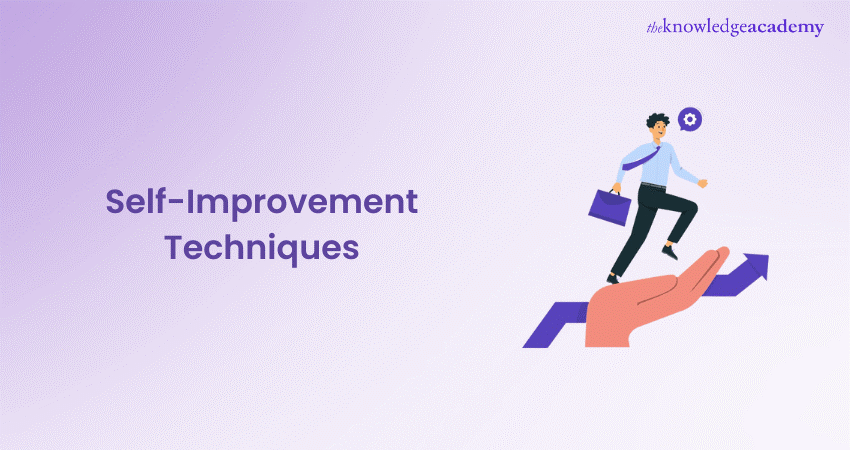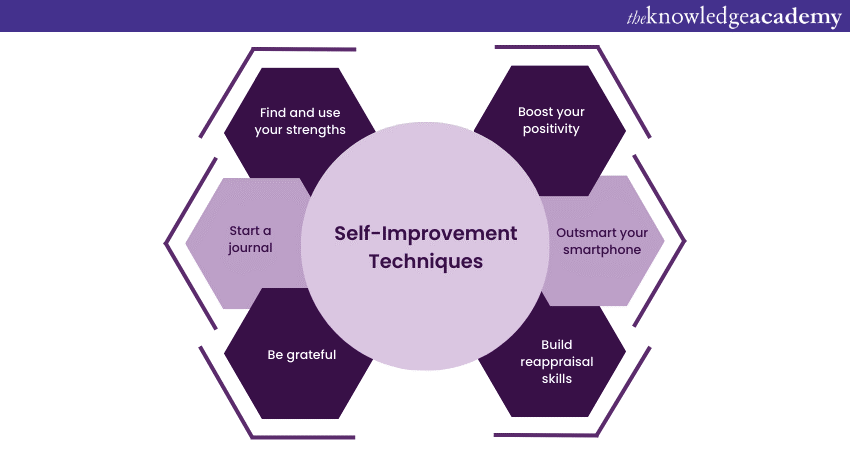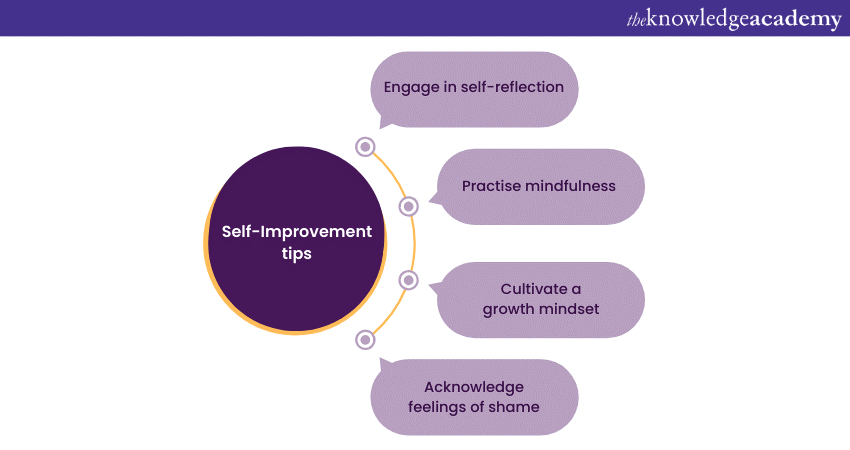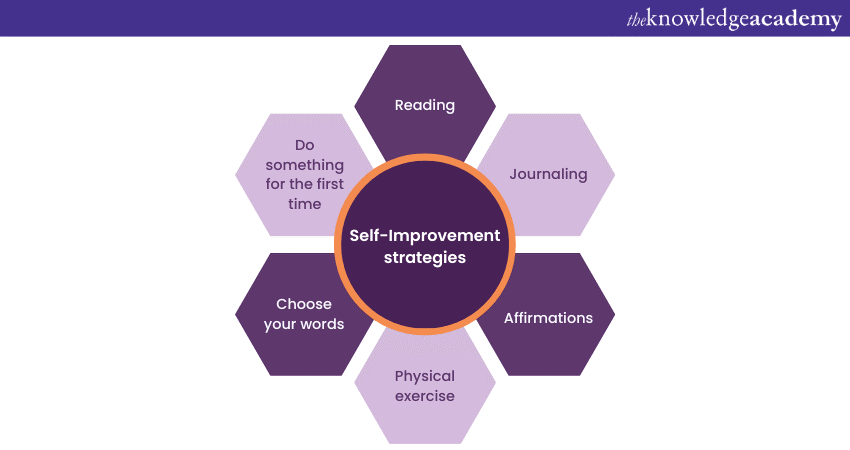We may not have the course you’re looking for. If you enquire or give us a call on 01344203999 and speak to our training experts, we may still be able to help with your training requirements.
We ensure quality, budget-alignment, and timely delivery by our expert instructors.

The art of Self-Improvement Techniques serves as the compass guiding individuals on a transformative journey. From harnessing the power of mindfulness to setting concrete goals and even embracing one's unique strengths, these techniques are the keys to unlocking a more fulfilling, empowered, and purpose-driven existence.
Explore a range of Self-Improvement Techniques designed to help you achieve personal growth and development. Discover practical strategies and tips through our comprehensive blog. Read more to learn more.
Table of Contents
1) What is Self-Improvement?
2) Self-Improvement Techniques
3) Self-Improvement tips
4) Self-improvement strategies
5) How to make a Self-Improvement plan?
6) Conclusion
What is Self-Improvement?
Self-Improvement is the conscious, ongoing effort to enhance one's personal qualities, skills, and knowledge to become a better version of oneself. It involves setting goals, acquiring new abilities, and fostering a growth mindset. Self-Improvement encompasses various areas of life, including physical fitness, emotional intelligence, career development, and mental well-being.
It is a dynamic journey that empowers individuals to evolve, adapt, and reach their full potential continually. Social factors often influence insight into our self-improvement despite it being a personal pursuit. That is, we often use feedback from others to help us measure our improvement.
Learn about the various career development challenges and ways to overcome them with our Career Development Masterclass!
Self-Improvement Techniques
The following are a few Self-Improvement Techniques that can help you enhance various characteristics of yourself.

1) Boost your positivity
Enhancing one's positive neural networks can be facilitated through the memorisation of affirmative vocabulary. The rationale behind this is rooted in the way our brains function, i.e., each time we engage with positive information, our neural connections related to these experiences become reinforced. This principle also applies to negative stimuli.
Consequently, committing positive words to memory can fortify the neural pathways that link positive concepts, recollections, and thoughts. This uncomplicated practice could serve as a practical starting point for cultivating a greater sense of positivity and optimism in one's life.
2) Outsmart your smartphone
In today's digital age, our smartphones provide a plethora of engaging distractions, from social interactions and news updates to games and a multitude of apps. While these technological marvels offer a world of convenience and entertainment, they also carry the potential to impact our overall well-being negatively. Understanding how to cultivate a more mindful and balanced connection with your phone and other technology can be a valuable avenue for Self-Improvement.
Overuse of devices can lead to issues such as digital addiction, decreased productivity, and even adverse effects on mental health if not managed wisely. Therefore, the pursuit of a healthier, more harmonious relationship with your phone is a commendable endeavour in the journey of personality development.
3) Build reappraisal skills
Reappraisal stands as a valuable emotion regulation technique, enabling individuals to reframe a stressful situation in a manner that minimises the impact of negative emotions while elevating positive sentiments. This method involves consciously altering your perspective when faced with adversity.
For instance, you can choose to view a challenging circumstance with a more positive lens. You can extract beneficial aspects from the situation, such as recognising it as an opportunity for personal growth and character development.
The mastery of this skill is a gradual process that becomes more fluid and effortless with practice. As you consistently employ reappraisal, you cultivate the ability to reevaluate stressful situations effectively. It will help you ultimately foster emotional resilience and a more optimistic outlook on life's challenges.
4) Be grateful
Cultivating a sense of gratitude or thankfulness stands as a powerful means of personal growth and Self-Improvement. Gratitude is intrinsically connected to enhanced overall well-being and the establishment of more profound and meaningful relationships. One effective method is to maintain a gratitude journal where you regularly record the things and moments for which you are thankful.
This practice prompts you to consciously recognise and appreciate the positive aspects of your life, whether they are significant or seemingly mundane. It is a technique that encourages you to focus on abundance rather than scarcity, fostering a sense of contentment and fulfilment. You can explore lists of things to be thankful for, which can serve as a source of inspiration to kickstart your gratitude journey and fuel ongoing Self-Improvement.
5) Start a journal
Engaging in the practice of daily journaling proves to be a tool for processing challenging life experiences, manifesting aspirations, and constructively delving into one's emotions. The act of consistently writing in a journal allows individuals to not only document their lives but also to reflect upon and make sense of their innermost feelings.
Through the written word, one can navigate and find resolutions to difficult situations while also charting the course towards achieving personal goals and ambitions. Journaling provides a creative and safe outlet for exploring the intricacies of one's mind. It also helps foster self-awareness and generate insights into personal growth.
6) Find and use your strengths
It is expected to fixate on addressing our weaknesses, those areas where we may fall short of our desired standards. However, it is equally valuable to recognise the potential for personal growth by harnessing and refining our strengths. Developing and amplifying our strong points can empower us to achieve a level of mastery in specific skills and abilities.
If you need clarification on what your unique strengths might be, discovering them is a crucial first step. By understanding your strengths and leveraging them, along with the insights from Use Artificial Intelligence to Improve Your Skill, you not only enhance your competence but also foster a more well-rounded and resilient self, ultimately bolstering your journey toward self-improvement.
Learn the importance of goal setting with Motivation And Goal Setting Training and successfully maintain motivation strategies!
Self-Improvement tips
There are multiple ways through which we can improve ourselves. The following are some Self-Improvement tips that can help with the same:

1) Engage in self-reflection
Self-reflection constitutes a fundamental pillar of self-awareness. It is essential for the alignment of our self-concept with how others perceive us. This reflective practice enables individuals to gain insight into their thoughts, emotions, behaviours, and the dynamics that shape their identities.
Through self-reflection, one can identify areas for personal development and Self-Improvement, thus bridging the gap between self-perception and external perception. By scrutinising our actions and motivations, we attain a more profound comprehension of our strengths and weaknesses, allowing for informed and intentional growth.
2) Practise mindfulness
Mindfulness is the practice of directing our awareness to the present moment, accompanied by a mindset of curiosity and acceptance. This approach to living in the "here and now" fosters a deeper connection with our immediate experiences, unburdened by preconceived notions or biases.
Like self-reflection, mindfulness has the potential to cultivate an open-minded receptivity to various encounters and opportunities that can facilitate personal growth and Self-Improvement. Individuals can develop a deepened sensitivity to their inner world and the intricate interplay of thoughts and emotions by embracing mindfulness.
3) Cultivate a growth mindset
A growth mindset is a cognitive outlook characterised by the conviction that our capabilities and skills are not fixed traits but relatively flexible attributes that can be cultivated and enhanced. When an individual harbours this belief in the capacity for improvement, one demonstrates a heightened willingness to invest the necessary effort required for learning and personal growth, much like in Asynchronous Learning, where individuals take initiative and progress at their own pace.
This mentality becomes a driving force behind our pursuit of goals and the achievement of our desired Self-Improvement. It allows an individual to view challenges as opportunities for development and setbacks as stepping stones to progress. It helps us to make significant strides in our personal and professional aspirations.
4) Acknowledge feelings of shame
In our quest for Self-Improvement, it is evident that external factors, like societal pressures and the expectations of others, often drive our motivations. An underlying sense of inadequacy or shame in certain areas fuels our desire to better ourselves. The critical point to consider is that if we embark on the path of Self-Improvement solely to appease external influences, the fulfilment we seek remains elusive, even when we attain our goals.
It becomes imperative to scrutinise the motives propelling our Self-Improvement journey. By acknowledging any shame and reassessing our objectives, we can ensure they align with our intrinsic values and authentic aspirations. True Self-Improvement arises when we genuinely connect our growth with our core principles. It is about evolving for us, guided by our compass rather than external influences.
Self-improvement strategies
The following are proven Self-Improvement strategies that can help you adopt a growth mindset and discover principles of life.

1) Reading
Books are great friends in our self-development journey. Books serve as catalysts for intellectual and emotional growth, offering insights into diverse cultures, philosophies, and disciplines. They empower us to explore new perspectives, challenge our existing beliefs, and nurture our curiosity. Whether you aim to boost your skills, gain wisdom, or savour the joy of storytelling, the written word remains an invaluable tool for Self-Improvement and an enduring source of enlightenment.
2) Journaling
The act of documenting our thoughts serves as a powerful means to attain a clearer perspective on our inner world. The disciplined practice of maintaining a journal on a regular basis offers the opportunity to unearth recurring patterns and ideas of oneself.
Through consistent journaling, one gradually unearths themes and concepts that merit further exploration and possible development. This deliberate exercise not only cultivates a heightened sense of gratitude but also fosters improved self-awareness and self-esteem.
Improve your writing skills with Creative Writing Training and learn to handle creative writing challenges!
3) Affirmations
Affirmations serve as a potent tool for articulating our intentions and reinforcing the core values that guide our lives. Engaging in the practice of daily affirmations empowers us to purposefully centre our attention on the principles and priorities that hold significance to us, facilitating their integration into our daily existence.
4) Physical exercise
Physical activity is integral to maintaining one's physical well-being. The body serves as a remarkable source of insight, continuously sending signals about its requirements and condition. The body communicates its needs and status through sensations, energy levels, and overall health. One must heed these cues and engaging in regular exercise to maintain a balance between physical and mental well-being.
5) Choose your words
Attentively observing our words and expressions can significantly influence the course of our daily lives. Practising mindfulness regarding both the content and manner of our communication serves as the initial stride toward gaining deeper self-awareness and personal growth.
6) Do something for the first time
It is an opportunity to venture beyond the boundaries of familiarity, explore the unexplored, and embrace the thrill of the unknown. By doing something for the first time, individuals expand their horizons, cultivate resilience, and stimulate their creativity. They step out of their comfort zones, inviting personal growth and transformation.
How to Make a Self-Improvement plan?
Creating a Self-Improvement plan is a systematic and proactive approach to enhancing various aspects of one's life. The planning begins with a deep self-assessment. This involves identifying personal strengths, recognising weaknesses, and pinpointing the specific areas in your life that you desire to improve. Self-reflection forms the bedrock of your Self-Improvement plan, providing clarity for setting objectives.
The next step is to establish precise, measurable, and attainable goals. These goals must be directly relevant to your Self-Improvement journey and come with a defined timeframe for achievement. Not all facets of Self-Improvement demand equal attention simultaneously. Prioritising your goals is essential to craft a focused and manageable plan.
Each significant goal should be broken down into smaller, actionable steps. Identifying the necessary resources, knowledge, and support is crucial. This may involve reading books, enrolling in courses, seeking mentorship, or participating in self-help activities.
Conclusion
Self-Improvement Techniques are not mere tools; they are the keys to a brighter, more empowered tomorrow. Self-Improvement Techniques act as the threads that weave together our aspirations and our realities. They remind us that we possess the agency to shape our destinies, overcome obstacles, and unlock our true potential. As we embrace these strategies for personal growth, we open doors to endless possibilities and heightened self-awareness.
Become familiar with word sense disambiguation and coreference resolution with Sentiment Analysis Training
Frequently Asked Questions
What are the Other Resources and Offers Provided by The Knowledge Academy?

The Knowledge Academy takes global learning to new heights, offering over 3,000 online courses across 490+ locations in 190+ countries. This expansive reach ensures accessibility and convenience for learners worldwide.
Alongside our diverse Online Course Catalogue, encompassing 19 major categories, we go the extra mile by providing a plethora of free educational Online Resources like News updates, Blogs, videos, webinars, and interview questions. Tailoring learning experiences further, professionals can maximise value with customisable Course Bundles of TKA.
Upcoming Career Growth Batches & Dates
Date
 Attention Management Training
Attention Management Training
Fri 23rd May 2025
Fri 25th Jul 2025
Fri 26th Sep 2025
Fri 28th Nov 2025






 Top Rated Course
Top Rated Course



 If you wish to make any changes to your course, please
If you wish to make any changes to your course, please


